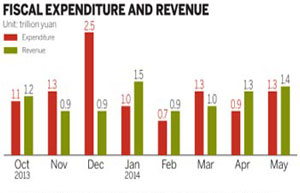China fiscal revenue slows sharply in July
(Xinhua) Updated: 2014-08-12 09:40BEIJING - China's fiscal revenue growth decelerated sharply in July, which could complicate the government's efforts to stabilize the slowing economy and revamp its fiscal system.
Fiscal revenue rose 6.9 percent from a year ago to 1.27 trillion yuan ($206.5 billion) in July, slowing from the 8.8-percent rise seen in June, according to data from the Ministry of Finance on Monday.
The pace of fiscal spending also slowed in July, as national fiscal expenditures went up 9.6 percent to 1.03 trillion yuan, retreating from a 26.1-percent surge in June.
|
 |

|
In the January-July period, fiscal revenue collected by the central government fell short of the budgeted full-year growth of 7 percent, expanding 6 percent year on year to 4.07 trillion yuan, while revenue for local government increased 10.8 percent to 4.66 trillion yuan.
"In the coming months, it will be quite difficult for central fiscal revenue to grow," the MOF said in a statement, citing more tax cuts under a program to replace business tax with value-added tax (VAT) and a higher comparison base last year.
The weak fiscal revenue growth could create pressure for China's policymakers to stabilize the economy, which grew 7.4 percent year on year in the first half, the highest of all major economies but below the full-year target of 7.5 percent.
China has vowed to revamp its fiscal and tax system as part of efforts to jumpstart a new round of across-the-board reforms in the country.
Last month, Finance Minister Lou Jiwei said China would improve its tax collection and fiscal budget systems and redefine the financial obligations of its central and regional governments by 2016.
China's present fiscal system, which leaves too many spending obligations with regional governments without giving them an adequate share of fiscal revenues, is partly blamed by some analysts for the current local government debt problem.
Chinese governments at various levels owed a total of 20.69 trillion yuan, according to a state audit of public finances last year.
- New yuan loans run into rough weather
- Inner Mongolia coal production slumps
- Chinese company completes massive Angolan railway
- China's property sector likely to recover in Q4
- Amore Pacific's Q2 profit surges on brisk sales in China
- Cambodia attracts 230,100 Chinese visitors in H1, up 19%
- China's July money data cast doubts on recovery's durability
- New insurance solution for disaster relief in China















